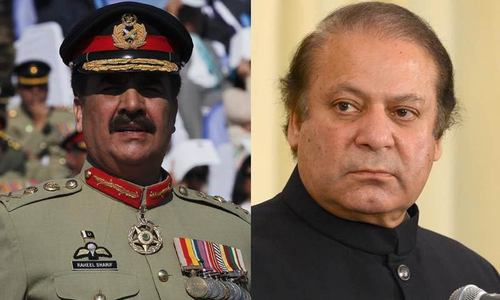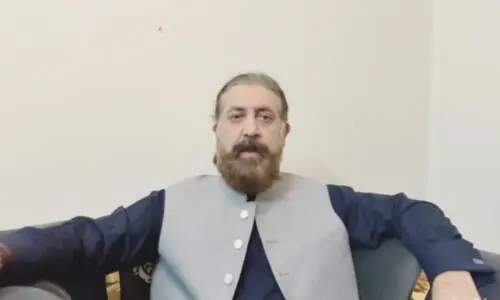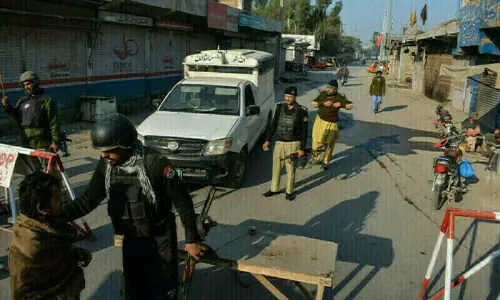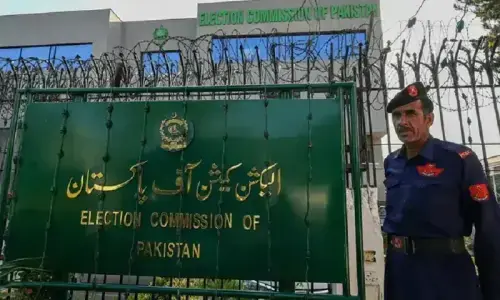THE civil-military saga continues to be the biggest story coming out of Pakistan in the aftermath of the Kartarpur opening. Many of the guests invited for the ceremony haven’t stopped talking about all that is hunky-dory between the PTI and the military.
Not that the visitors can be blamed, for most of us living here can’t get over it either. Be it the critics of the government or the government itself, this is a love story everyone believes in. The prime minister himself can’t stop raving about it. Last week, he claimed that the military stood by his party’s manifesto, forcing the military spokesman to clarify what he meant.
This obsession with all things nice between the inhabitants of the Prime Minister’s Secretariat and those who live in Pindi is a bit hard to understand, considering that there hasn’t been a government which didn’t strive for and claim to be best friends with the military in recent years.
Second, it is also hard to wrap one’s head around this conclusion that all is well because Imran Khan was helped on his way to Constitution Avenue.
And third, that he will get along well with the military because he wants to.
The second of these arguments should have been put to bed a long time ago, thanks to the manner in which each of the PML-N’s terms have ended. The first and the third have been challenged continuously in the post-2008 period, and yet we expect Khan to live happily ever after.
The PPP and the PML-N too have had good moments with the generals, as well as bad and ugly ones.
The 2008 elections followed complicated negotiations between the PPP and Musharraf (who was represented by Gen Asfhaq Kayani at times) which basically ended with the understanding that elections would be held and the PPP would be part of the government that came into being. That Kayani was more than just Musharraf’s spokesman was obvious as time went on.
Exclusive: The curious Presidency of Mr Zardari
The dispensation that came into being under the PPP was never too uncomfortable letting the army take control. It was in those heady days that Gen Kayani held meetings with secretaries of key ministries such as finance, commerce and agriculture at GHQ for the strategic dialogue with the United States. Civilian supremacy was a myth back then too; we just liked to pretend otherwise.
If anyone needs a reminder of the role Kayani played in those days when democracy was vibrant, the politicians more independent and the press freer, they should just go through the WikiLeaks cables. At one stage, Kayani even bared his soul to the US ambassador about ‘changing’ the president at the height of the long march in 2009. And despite Kayani’s dominance and the PPP’s mild manner, Asif Ali Zardari barely spent six months without rumours of his departure circulating.
In those days, the main opposition party wasn’t averse to playing footsie with Kayani either. The 2008-2013 period was when Shahbaz Sharif and Chaudhry Nisar Ali Khan were regular visitors of a certain address in Pindi. And neither did Nawaz Sharif’s distrust of the army (which we are all supposed to accept blindly) prevent him from going to court on Memogate. He is the one who asked the chief justice to find out more about the Memogate scandal which had ‘ridiculed’ and ‘maligned’ the armed forces. Wonder where he got the idea from?
In fact, there were many in those days who thought that Nawaz Sharif, when he came to power, would enjoy a more stable rule and better relations with the military because he was Punjabi and a product of military rule. Neither of these predictions came true.
Nawaz Sharif’s relations were even more tumultuous than Zardari’s, despite the fact that he worked with three different army chiefs. If Kayani’s stint passed quickly enough, the other two seemed much longer than they were for the roller-coaster ride that was civil-military relations. But like the PPP, Nawaz Sharif didn’t declare war from day one. It was a love-hate relationship in which there were always efforts to fix the relationship till the summer of 2017.
Let’s not forget that at the height of the 2014 dharna, the prime minister stood up in parliament and wondered if the good general in Pindi would bother to mediate between those sitting in parliament and those besieging it. And Raheel Sharif took the speech so seriously that he invited Tahirul Qadri and Imran Khan over for a chat. This happened at a time when the entire PML-N and many more believed that the dharna was orchestrated by some around Gen Sharif.
Dharna deadlock: Govt, PTI negotiators begin talks to end crisis
This is not just a rant against the hypocrisy of the parties now facing the wrath of the establishment, but to argue that civil-military relations sour because of political fault lines. Despite the baggage of the 1990s, the PPP and the PML-N too have had good moments with the generals in charge, as well as bad and ugly ones. And such is the nature of politics that the ugly ones dominate.
Also, there is little chance that Imran Khan will have a very different experience. Despite our tendency of turning civil-military relations into simple cases of personality clashes, this is far from reality. The tension doesn’t happen because the Punjabi-dominated military doesn’t like Zardari or that Nawaz Sharif hasn’t been able to get along with a single military chief. Neither is it a case of military chiefs not being able to make nice with politicians.
The problem is structural.
There is bound to be tension between a dominant stakeholder and a civilian government which by dint of being in charge ends up making decisions that will not always please the former. This — and not personalities — causes the friction.
The opposition parties should remember this (and their own backstage dealings with the military) as they complain about Khan’s links with the establishment. And the PTI would do well to remember this the next time it wants to once again hold forth about the ‘one page’. Their Cinderella moment will end too, once the clock strikes midnight.
The writer is a journalist.
Published in Dawn, December 11th, 2018



































